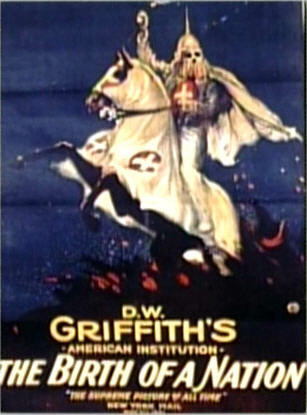 After watching a few frames of the film, I became a little creeped out by the way that these silent film actors would be overacting, at least by today's standards. Seems that the exaggerated mannerisms and bugged-out eyes were necessary to convey emotion back in the day. Nevertheless, come the morning, I looked up the film on Wikipedia. Turns out the film is a two-acter, split by an intermission. Here is a summary of the second act, which nearly caused me to do a 'spit take' on my computer:
After watching a few frames of the film, I became a little creeped out by the way that these silent film actors would be overacting, at least by today's standards. Seems that the exaggerated mannerisms and bugged-out eyes were necessary to convey emotion back in the day. Nevertheless, come the morning, I looked up the film on Wikipedia. Turns out the film is a two-acter, split by an intermission. Here is a summary of the second act, which nearly caused me to do a 'spit take' on my computer:- Part two begins to depict Reconstruction. Stoneman and his mulatto sidekick Silas Lynch go to South Carolina to personally observe their agenda of empowering Southern blacks via election fraud. Meanwhile, Ben Cameron, inspired by observing children pretending to be ghosts, devises a plan to reverse perceived powerlessness of Southern whites by forming the Ku Klux Klan, although his membership in the group angers Elsie Stoneman.
Then, Gus, a murderous former slave with designs on white women, rudely proposes to marry Flora Cameron. She flees into the forest, pursued by Gus.
 Trapped on a precipice, Flora chooses death to avoid letting herself be touched by a Black man. In response the Klan hunts Gus, lynches him, and leaves his corpse on Lieutenant Governor Silas Lynch's doorstep. In retaliation, Lynch orders a crackdown on the Klan. The Camerons flee the African-American militia and hide out in a small hut, home to two former Union soldiers, who agree to assist their former Southern foes in defending their "Aryan birthright", according to the caption.
Trapped on a precipice, Flora chooses death to avoid letting herself be touched by a Black man. In response the Klan hunts Gus, lynches him, and leaves his corpse on Lieutenant Governor Silas Lynch's doorstep. In retaliation, Lynch orders a crackdown on the Klan. The Camerons flee the African-American militia and hide out in a small hut, home to two former Union soldiers, who agree to assist their former Southern foes in defending their "Aryan birthright", according to the caption.Meanwhile, with Austin Stoneman gone, Lynch tries to force Elsie to marry him. Disguised Klansmen discover her situation and leave to get reinforcements. The Klan, now at full strength, rides to her rescue and takes the opportunity to evict all of the Blacks. Simultaneously, Lynch's militia surrounds and attacks the hut where the Camerons are hiding, but the Klan saves them just in time. Victorious, the Klansmen celebrate in the streets, and the film cuts to the next election where the Klan successfully disenfranchises black voters. The film concludes with a double honeymoon of Phil Stoneman and Margaret Cameron and Ben Cameron with Elsie Stoneman. The final frame shows masses oppressed by a warlike ruler transformed into angelic figures under a Christ-like representation. The final title rhetorically asks: "Dare we dream of a golden day when the bestial War shall rule no more. But instead-the gentle Prince in the Hall of Brotherly Love in the City of Peace."
No comments:
Post a Comment